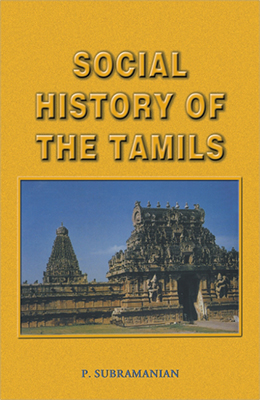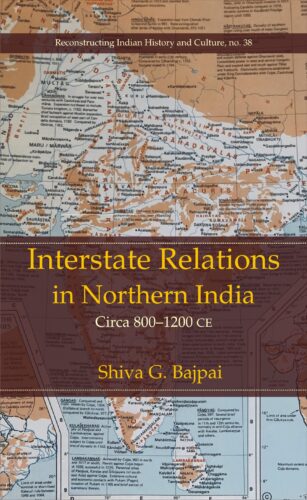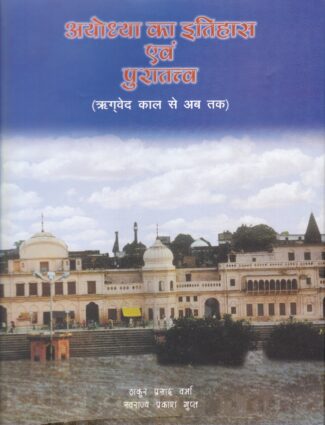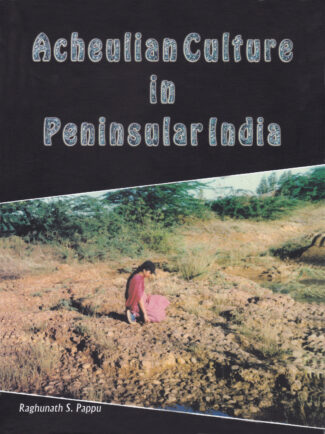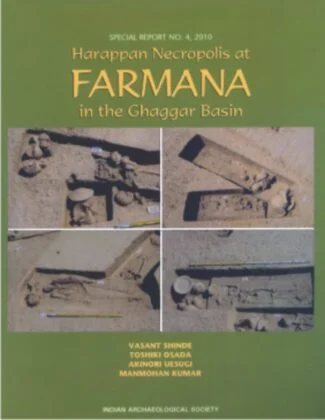

Harappan Necropolis ...
Harappan Necropolis at Farmana in the Ghaggar Basin
by: Vasant Shinde , Toshiki Osada , Akinori Uesugi , Manmohan KumarThis book unfolds the unknown aspects of the Harappan civilization. It throws light on Harappan people’s composition, movement, dietrary habits and burials; and also on the study of human skeletal remains.
₹1,000.00 Original price was: ₹1,000.00.₹900.00Current price is: ₹900.00.
ISBN: 9788124608494
Year Of Publication: 2009
Edition: 1st
Pages : 103
Language : English
Binding : Paperback
Publisher: Indian Archaeological Society
Size: 28 cm.
Weight: 450
This book unfolds the unknown aspects of the Harappan civilization. It throws light on Harappan people’s composition, movement, dietrary habits and burials; and also on the study of human skeletal remains.
- Sale!Social History of the Tamils (1707-1947) by: P. Subramanian
₹1,600.00Original price was: ₹1,600.00.₹1,440.00Current price is: ₹1,440.00.Notwithstanding the prolificity of indepth researches in contemporary historiography, Professor Subramanian’s book is the first concentrative effort to track down the social history of the Tamils. Today, the Tamils, over fifty million of them, live in the south-eastern state of the Indian peninsula: Tamil Nadu — which indisputably represents the very nucleus of millennia-old Dravidian culture in India. The book offers a compelling account of the Tamils’ society, economy, religious beliefs, educational mechanisms, arts, and cultural expressions during the years 1707-1947 — when, significantly, the British domination blossomed, bloomed, and faded; when new thoughts, new ideas, and new ways of life came as irresistibly into the homeland of the Tamils as into the Indian subcontinent. Thus retracing over two centuries of the ‘British connextion with India’, the author here tries to show how the long colonial rule in India exposed the tradition-bound Tamilian society to Western influences — with results that proved incalculable in both their range and depth. Social History of the Tamils : 1707-1947 is the outcome of Professor Subramanian’s decade-long, painstaking research, authenticated by an astonishing mass of evidence including archival records, Jesuit sources, Modi (Maratha) manuscripts, newspapers’ reports, biographies, travelogues, literary writings, and even fictional works.
- Sale!Apsarases in Indian Literature and the Legend of Urvasi and Pururavas by: Krishna Kanta Handique
₹350.00Original price was: ₹350.00.₹315.00Current price is: ₹315.00.Indian literature abounds in a variety of myths and legends narrating allegorical/historical stories with moral teachings where celestial or semi-celestial beings, in particular the apsarases, occupy an important place. Of such legends, a few have become much popular and they reappear in the course of the history of literature at various stages. One such legend is that of Urvashi and Pururavas which is one of the most ancient legends of India, owing its origin to the Rigveda. This scholarly work, based on extensive original sources primary, comprising ancient Sanskrit texts, commentaries and glosses and modern literary pieces, kavyas and plays, as well as critical writings on these original works, studies the origin and development of the institution of apsarases and their characteristics as described in the vast corpus of Vedic, Epic-Puranic and classical works. In this context, it undertakes an interesting survey of the concept of nymphs (apsarases) in Indo-European, especially Greek mythology. Dr. Handique then thoroughly examines the depiction of the legend of Urvashi and Pururavas a favourite theme that has been immortalised in literary masterpieces in Indian literature as a whole: from the ancient Vedas and Puranas, the Harivamsha and Vikramorvashiyam to modern works like Urvashi Janani and Abhishapta Urvashi and stray poetic pieces. Presenting a new angle to the study, the book attempts to explore aspects of an age old tradition that bears close affinity with the institution of the apsarases in terms of mode of living worship and ideals like system of the devadasis. The book will prove invaluable to scholars of Indian mythology, culture and literature as well as interest general readers of ancient India’s legends and tales.
- Sale!Interstate Relations in Northern Indian by: Shiva G. Bajpai
₹1,400.00Original price was: ₹1,400.00.₹1,260.00Current price is: ₹1,260.00.The book thus delves deep into the philosophies of both Bdaryaa and akara in enunciating the essential features of Brahman and Its association with the world. It thus discusses topics such as what sort of cause Brahman is?, and what sort of material causality is to be ascribed to It? It also addresses the conflicting views on the nature of Brahman like that of Vivarttavda and of Rmnuja’s Sagua-Brahman.
- Sale!Ayodhya ka itihasa evam puratattva Rgveda kala se aba taka by: Thakur Prasad Verma, S.P. Gupta,
₹1,100.00Original price was: ₹1,100.00.₹990.00Current price is: ₹990.00.T.P. Verma and S.P. Gupta, after several years toil, have here presented the history of Ayodhaya in a chronological form from Rgveda times till today which has been proved with the evidences from archaeology, coinages, scriptures, etc.
- Sale!Acheulian Culture in Peninsular India by: Raghunath S. Pappu
₹455.00Original price was: ₹455.00.₹410.00Current price is: ₹410.00.The Indian sub-continent, particularly the Peninsular India, is recognised as one of the richest areas of Acheulian occupation in the Old World. This research work is a detailed study of the Acheulian Culture system in India signifying the earliest cultural occupation here. The book examines the cultural material of the Acheulian phase in its ecological setting to throw light on the distribution pattern, nature of habitats, Quaternary deposits, mammalian and hominid remains, land use and subsistence, site formation process, genesis and chronology of the Acheulian cultural system. Incorporating his own field observations over the last three decades and more as well as integrating and synthesising the available data and evidence on Acheulian culture, Dr. R.S. Pappu presents a comprehensive understanding of the Acheulian system and, in general, behavioural patterns of early hunting and food gathering communities. He also provides an account of the progress of Palaeolithic research in India since the first discovery of Palaeolithic settlement by Foote in 1863, tracing the major projects and contributions of noted Indian geo-archaeologists.



